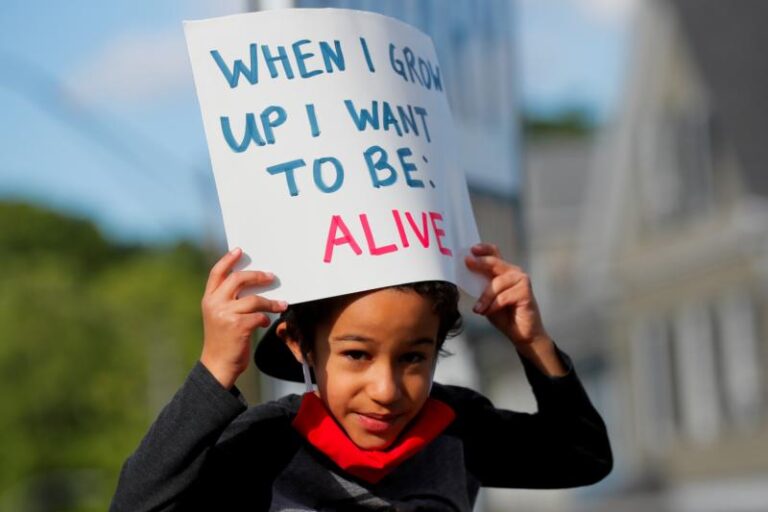We live in an era of grievance, real and imagined. It is the new normal to feel threatened, abandoned or discomforted by someone or something. As our society struggles with the coronavirus pandemic, some feel aggrieved at the political and public health failures that allowed it to take hold; others at the subsequent efforts to prevent its spread. The phenomenon even affects our conduct as a nation: the world’s most powerful state acts as it is being abused by the world order it largely created.
Amidst these imagined grievances, the latest national tragedy of black deaths at police hands reminds us that there are real grievances in our society, and they have been left unaddressed for far too long.
Black people in America have survived slavery, the dark period of lynching and violence that followed, systematic enforced segregation and disenfranchisement, and the bloody days of the early civil rights era, yet recent events make clear that our national struggle for racial equality and equal justice remains very far from complete.
Like so many beneficiaries of white privilege, I have observed that struggle my entire life – sad to say, mostly in silence. In fact, as a kid in the 1950s and 60s, I harbored the grievance that I was a victim of the civil rights struggle in Baltimore. As that movement became visible and vocal, the push for better housing disrupted West Baltimore neighborhoods that were home to my family. Demonstrations for equal access denied me access to public facilities: no more school picnics at Gwynn Oak Park. It all seemed sad and frightening, even before Dr. King’s assassination produced the 1968 riots that scarred the city with war zones that remain in many places today.
Many of us have been stuck in that place for a very long time. Until I read Antero Pietila’s “Not In My Neighborhood,” I had never understood the extent to which the segregation and discrimination we all see in Baltimore were not only common practice, but enshrined in public laws and city ordinances that codified those practices for generations. I was saddened to read that St. Bernardine’s parish, attended by my family members, was part of the resistance to change in the neighborhoods along Edmondson Avenue. The demands for justice that roiled our society and inconvenienced me were someone else’s quest for a decent home and education. There was legitimate grievance, but it was certainly not mine.
So I found it particularly apt that Bishop Denis J. Madden marked the last Martin Luther King national holiday by conducting a prayer walk at St. Bernardine. It is now a vibrant faith community, predominantly home to African-American Catholics, and a sign of God’s presence in a struggling neighborhood. After many years separation, I visited the parish after our friend, Monsignor Rich Bozelli, became its pastor. There is no more welcoming community of faith to be found. Moving from grievance to reconciliation was a blessing in that brief moment, but the legacy of slavery and Jim Crow, systematic discrimination, mass incarceration and police violence remain a curse on black lives every day.
As people take to the streets over the deaths of Ahmaud Arbery, Sean Reed, Breonna Taylor, George Floyd and Rayshard Brooks, we are reminded that there is much work ahead to achieve reconciliation among races and cleanse this stain on our national history. That will not be an easy task but there are practical steps we can each take now.
We can elect public officials who make inclusion and reconciliation a priority of their programs. We can insist that our police and justice systems remedy racial disparities and dispense impartial justice. We can review our civic history and make amends wherever that is possible, as Georgetown, Harvard and other prominent institutions are addressing their legacies of slave ownership. Where specific victims are known or specific rights or benefits denied, we should find appropriate forms of compensation.Trace the descendants of victims cataloged in the Birmingham lynching museum and have the communities that were the scene of the crimes compensate their families. Offer GI Bill benefits to the descendants of black WW-II veterans who were denied those privileges. There are surely many other examples.
Neither current injustice nor horrific acts in our history can be erased through memorial plaques or financial compensation, but healing can begin if we acknowledge the wrong, seek forgiveness and attempt to make amends. We must reset our bearings as a church to recognize that the extent of our focus on the challenges facing people of other races and ethnicities should not be determined by whether they are Catholic but based on the motivation that we are Catholic. We must reset our bearings as a nation so that our collective future is not just whatever happens next but a conscious pursuit of our national credo: one nation, under God, indivisible, with liberty and justice for all.
Also see:
Least of These: Despite gains, barriers remain in overcoming bigotry
Copyright © 2020 Catholic Review Media


